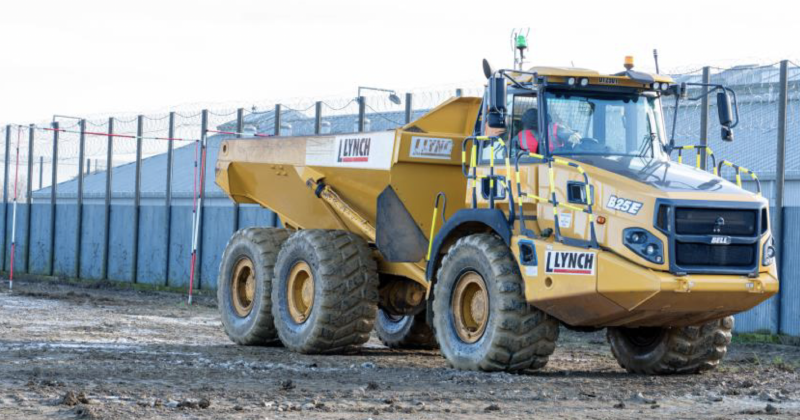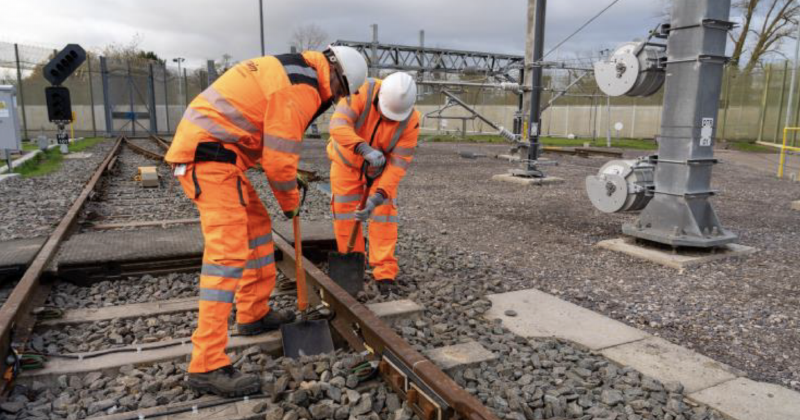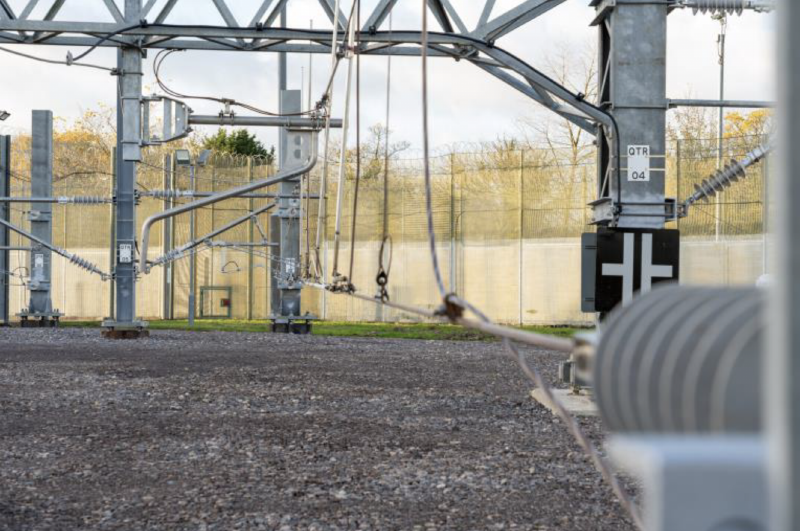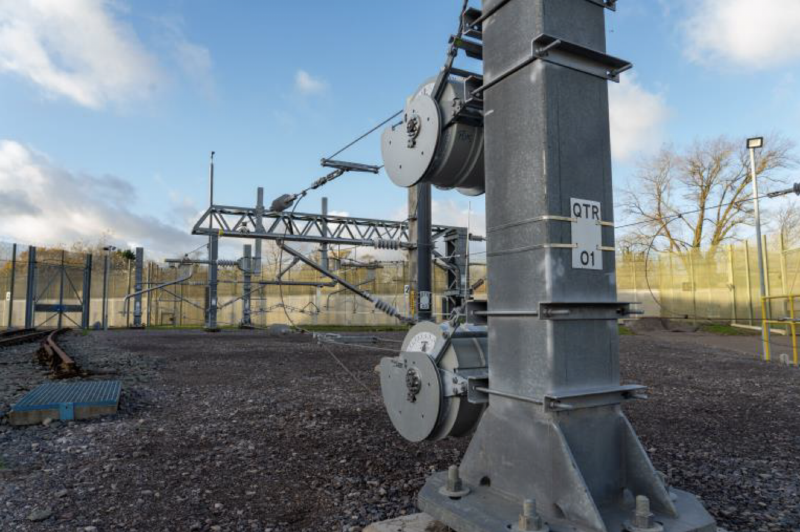With England’s prisons bursting at the seams and inspectors repeatedly slamming education behind bars for failing to cut reoffending, one jail is bucking the trend. Jessica Hill reports from HMP Highpoint, where prisoners are learning skills that lead to real jobs – and real change
I never imagined that I would be driving a 25-tonne dumper truck across muddy, bumpy terrain inside a category C prison, with only a single-skin fence between me and the green fields of freedom beyond.
I am at HMP Highpoint in Suffolk to witness a unique initiative training prisoners in construction and rail infrastructure skills, with “guaranteed jobs” on release. What sets this programme apart is that the prisoners get to operate the same vehicles, machinery and infrastructure – including rail tracks, signalling systems and overhead lines – as exist in the world beyond those fences.
The partnership between the prison, City & Guilds, probation services and industry provides wraparound support for prisoners after release, tackling one of the biggest barriers to reducing reoffending: employment.
But it is a huge gamble.
The day before my visit, Manchester Arena bomb plotter Hashem Abedi was making headlines for attacking three prison officers at HMP Frankland while on kitchen duties, bringing into sharp focus the risks involved in providing liberties to criminals.
For Steve Phillips, Highpoint’s head of education, skills and work, giving unskilled prisoners access to heavy machinery is high stakes: “What you are about to see scares the living daylights out of me,” he says.
Most of the prison’s 1,300 residents are serving time for violent or drug-related offences. Like all English prisons, space is tight. A new wing is being built that will make Highpoint the biggest jail in north-west Europe.
Injury claims by staff totalled £1.6 million between 2019 and 2023.
“Staff get assaulted every day in jails,” Phillips says. “You take the worst people in society and put them all under one roof, then expect them to just – like a light switch – be good. For some, that’s really difficult.”
But the trainers on this course paint a different picture. Chris Kent, a trainer from L Lynch Plant Hire, gets “goosebumps” when asked if he enjoys his job.
“I genuinely love being here. This isn’t just work, it’s about actually changing people’s lives and putting something back into an industry that for me has been wonderful.”

Tools of the trade
We overlook a patch of land that was once a disused sports field, now a working site where prisoners learn to operate dumpers, rollers and excavators.
Security is tight. A trench surrounds the training area, and a remote kill-switch is fitted to every vehicle. It hasn’t been needed yet.
City & Guilds Training executive director Alex Pond believes that is because this course is so sought-after. “These guys will give their right arm to get on this course,” he says. “They know that, if they mess up, then they’re done.”
George*, a participant, says his “inner child lit up” when he saw a poster for the course. “I mean, who doesn’t want to drive a dump truck?”
Kent invites me to give his six-wheel-drive digger a spin. It can go up to 35 miles an hour and has lots of buttons that I dare not press. I manage to drive it in a loop without running over any onlooking, bemused inmates.
The course awards a CPCS licence and has a waiting list of 100, though only 30 can participate at any one time. Eligibility depends on behaviour, English and maths skills, and being within six months of release.
James*, an orderly who now supports the training after completing it himself, says the incentive is powerful. It’s a “mechanism to make prisoners behave on the wing”.
The training pays £25 a week, making it one of the best-paid jobs available. For George, it’s not just about money. Prison life is monotonous, he says, and this course allows him to be out all day, not locked in after lunch.
“Treating the men as learners, not prisoners,” says Kent, helps to build confidence. George agrees: “It really helps with my self-esteem.”
A former military contractor with the demeanour of someone who previously led a privileged life, George never considered construction before. His conviction has closed off his previous career, and he is “daunted” by the prospect of “having to admit” his criminal record to prospective employers.
The course enables him to overcome that hurdle. “This is a whole new chapter for me. It’s wonderful. At the age of 45, I can start afresh, almost.”

Wraparound support
Kent says earning enough to support a family is key to staying out of trouble. Ex-prisoners can earn £18 an hour driving trucks straight out of the gate.
James, with three months left on an 18-month sentence, now feels he can support his eight children. The course has given him “something to look forward to”, he says.
Aron White, Highpoint’s employment lead, says consistent support post-release is vital. “Instead of leaving them at the gate, we’re trying to go through the gate with them.”
Having someone on the outside who is contactable day or night is “the main reason why this scheme is so successful”. But the early release of prisoners to ease overcrowding often brings extra restrictions that make employment harder.
Approved premises (APs) require up to five daily check-ins and 7pm curfews, and many prisoners are sent far from home.
“That can make it quite complex,” says Sam Hill, prison engagement coordinator at City & Guilds Training. Her team supports prisoners through these hurdles.
One learner that the City & Guilds team worked with was previously released from prison with nothing but a tent to sleep in – and was subsequently recalled.
Another was late signing in with his AP because his train broke down on the way to a training course. The City & Guilds team intervened to prevent him being recalled to prison for something “completely out of his hands”, explains project manager Holly Brown.
Her team also stump up the money for train tickets sometimes, so lack of funds does not become a “barrier to employment”.

Getting on track
I drive over to the south side of HMP Highpoint, where an overhead line, an electrical signalling system and 40 metres of rail track provide prisoners not just from Highpoint but across the country with rail infrastructure training. I almost expect a train to come hurtling towards me as we approach the tracks.
Highpoint is not the first prison to have installed a rail track, but “nothing to this scale” has been done before, says Phillips.
Alex Pond greets learners on the Personal Track Safety (PTS) course in a converted laundry room. He knows their struggles; he was taught to read and write by his wife at 21 before founding rail training firm Intertrain, which he later sold to City & Guilds.
“My point is, there is no ceiling,” he tells them.
This provision would not exist without Pond’s persistence. He secured a meeting in 2021 with then-skills minister Alex Burghart to agree that the City & Guild’s boot camps contract (currently worth £26 million) could be used inside a prison.
Then he and Brown went “through the doors of 30 to 40 different prisons” trying to initiate partnership work, with little interest from any except Highpoint. Pond puts this down to a “systemic problem with red tape” ” in UK prisons.
They raised £1 million from the City & Guilds Foundation, Aureos and the Clothworker’s Company among others.
Phillips credits his boss, the governor Nigel Smith, for being “bold and brave” enough to agree to all this. He is the prison’s longest serving governor, having been in post since 2012, but has “no top cover” on the initiative. “If it goes wrong, it sits with him.”
Smith says other governors would follow suit “if they could”, but they lack space and capacity.
Getting access inside a prison is rare for journalists, and Smith is wary of what I might publish. He is allowing me to visit, he says, because “City & Guilds deserve it”.
He adds: “Because of the investment they put in, we’re saving people’s lives as well as turning them around. This needs to be celebrated.”
A 2023 inspection found little to celebrate in Highpoint’s education provision, but that was before the construction option launched. And staff shortages highlighted then have now eased. “When you’re short-staffed in education, you can’t open everything all the time,” says Phillips.
Cleanliness is still a point of pride. Smith avoids one wing during our tour, where unrest over dirty conditions is brewing. The lack of available prison space nationally is disrupting stability at Highpoint because prisoners are more frequently moved in and out. “If we’re not careful, all the hard work we do here can be eroded just by that churn of prisoner,” says Smith. The new wing at Highpoint will accommodate over 700 more prisoners.

Full steam ahead
Since August 2022, 153 prisoners have completed the rail course. Of those released, 82 per cent have found employment – over four times the national average of 19 per cent. The construction course has an 80 per cent employment rate.
An overhead line course has now started, with signalling to follow.
The rail courses are putting the men on the right track, with salaries upon leaving prison starting at £30,000 a year and climbing to £80,000.
Trainer Sheldon praises the sector’s openness. “The rail industry would rather have someone who’s been in the system and works hard, than somebody who is not putting in the effort.”
Darren*, with 20 years’ construction experience, hopes rail work will help him to stay sober. He narrowly failed the PTS test and has waited three years for a second chance.
The rail skills academy also brings in prisoners from other jails as far afield as HMP Ranby in Nottinghamshire and HMP The Mount in Hertfordshire. They stay in Highpoint’s “hotel”, made up of prefabricated pods. With their own toilets, showers and cooking facilities, the pods are a step up from regular cells.
Michael* commuted in from another prison in Suffolk, HMP Hollesley Bay, at 5am to do the course. He started work two days after release. His prison course was more comprehensive than many paid ones.
“Walking on the ballasts is a skill in itself,” he says. “If you’ve never actually done it and you go out on the tracks for the first time, it’s a gamble.”
Phillips believes the employment outcomes and reduced offending which the training provides should incentivise other prisons to get on board. He is “disappointed” that only a handful have so far sent their prisoners to Highpoint for training.
Pond hopes to develop other centres of excellence in other prisons, perhaps in utilities or green building skills. He is also exploring commercial rail panel production at the prison to fund future training.

Future training
Phillips shows me the prison’s vocational training centre, where the provider People Plus –contracted through the Prison Education Framework – is holding a bricklaying workshop.
This year those contracts are being updated, but Phillips is concerned they will still provide “few incentives” for prisoners to engage without being linked to jobs on release.
A new workshop complex is being built at Highpoint with 14 classrooms and six vocational training workshops. Phillips would like to offer four of them up to City & Guilds, which sits outside the prison education contracts, to provide “sector-focused employment and training” for its prisoners.
But all this future provision depends upon City & Guilds’ ability to procure boot camp funding from new devolved authorities. The government is only extending the central funding for the construction boot camps.
This “worries” Pond. Prisoners are not necessarily released into the areas where their jail is based; most of Highpoint’s are from London. This means there is little incentive for a devolved authority to pay for prison-based training locally.
So, continuing and expanding the training provision probably depends on support from central government, as well as further buy-in from key industry players. Smith believes this will come in time.
“We just have to be patient,” he says, “because things take a long time to happen in prison. That’s what’s been the success of this. We’ve all stuck at it when it would have been easy to give up.”
*Names of prisoners have been changed to protect identities

















Absolutely Think this is a Brilliant idea,Without the slightest shadow of doubt!❤️ I’ve spent (according to the cps♂️ you know what they’re like,but yeah according to their said records I’ve spent) 4mths shy of 17yrs of my life in custody so 16yrs 8mths in prison’s all around the UK Including islands,but I’ll get to that… And I’ve Never Ever Even Heard of let alone seen Anything This Exciting and Creating a Prick ya Ears up,You Might Actually Learn Something From This & Give You A Warm Feeling Of Hope for a New You!!!!❤️ Admittedly I’ve been a bit of a non compliant prisoner,So Ending Up Doing My Sentences the wrong way around Going From a C-cat to a B-cat and ending up in the supermax dispersal system for the last year or so of my sentences ♂️ Whereas I should’ve been going from C-cat and after keeping my head down and keeping a low profile,well just staying out of segregation units and not performing. But I ended up with a kinda Adjustment Disorder Which Meant I Eventually Became Not Able to Adapt to the Outside World and all the fastness of ironically Getting Nowhere. So I had an Adjustment Disorder and Getting Nowhere Real Fast ♂️♂️ Well I was on a Hamster’s Wheel and taking drugs whilst my legs kept going my mental mindset wasn’t going anywhere other than hell! Sorry About That Long-Ass Autobiographical Novel About being a fuck-up. But my point I Tried to get round to IS I Didn’t Ever Think I Was Going To Be Able to Change The Cycle I Was Living In and Most Certainly Didn’t Think Anyone Would Ever Consider Actually Employing ‘ME!’ For Dead Certs! But I just had a vision of myself working on the train tracks with a radio blaring and coming home with my work hat on and my littlen’s coming running right up to me. We Did Blah blah at School Today Daddy How Was Your Day Did You See any Really Big Trains Today Whatta lovely thought/dream to have,aye??♂️ Instead of “Did you See Any Of Those Really Big Priced TrainErs Those Nice Ones Daddy Like The Ones I Said I Wanted like 15-20 times Daddy And My Friends Got an Even Better Pair Than Them,But I Don’t Mind Having Just The £375 pair of Nike air Jordans because I know you’re struggling Daddy… And That’s The Way I Expected It To Be Every Time I Came Out on The last 3,4 Times I’ve Been Away. And I’ve Gathered Some Seriously Bad Personality Disorders Along The Way,The Kinda Environments Like Whitemoor and Long Lartin Manifested Some Unhealthiness of Mindset. Sorry Getting Back I Think This Course/Training Course Option May Well Have Dragged Me Out Of This Whole “Everything’s Fucked-Up Anyways So I’m Just Gonna Take Some Rank Liberties Along The Way and If I Get Nicked I’m Back Where I Belong or Feel Comfortable In But If I Get Away With The Earner’s then I’ll Be Able To Look After The Kids Etc… Of Course With a Drug induced depression dodger I Wasn’t Even Thinking Straight About Me kids not Being Able To Get Everything They Need If or WHEN I’m back in prison Where To Me It Actually Was Really literally WAS Where I belonged! FINALLY!!!!♂️ They NEED Things like these Courses and Training to Be Able to Teach Us to Have Some Positive Thoughts and Help Us Have a Goal To Achieve That We Will Look Forward to Achieving and Being Positive And Successful Members of Society and the Community RESPECT For Your Bending Over Backwards To Help Us Help Ourselves ❤️
Absolutely brilliant idea, and will let individuals get a chance where for one reason or another they haven’t had before, this should be what prisons are about, reforming inmates with a sense of purpose and are able to have the help they need until they don’t need it anymore. We’ll done those who have pushed through the barriers and actually make a massive difference.
How many prisoners are making use of this scheme? There’s a huge difference to this type of course and leaving the establishment to go onto the open estate and be actually employed in the outside world, the courses are great giving the opportunity to learn the skills and gain the required certification. However when you move onto the open estate there are problems obtaining employment, usually down to the open estate lack of opportunities that have not passed relevant checks. If prisoners are identified earlier and offered these opportunities earlier in there sentence plans, they would be in a better position come recategorisation time to move to an open estate and be re integrated into society upon leading the open jail with an actual full time job under their belts. .
My son was released in sept in early release scheme he trained for railway tracks fantastic guaranteed job at the end again fantastic but on release was placed over 60 miles away in an ap then moved to tierer 3 still bout 50 miles away with tags with prohibition say he has to find somewhere to live i get that to but I dont know Private landlords that would be prepared to take on someone that hasn’t started work and has a tag so has know where to go an his po tells him bring box ti the office then gets recalled a week later for breach doesn’t make any sense to me
I Think It’s Fantastic….I was a Inmate at Highpoint….Back In The Days before They Turned It Back In To a Men,s…I Loved It and got so
Much
Help…I’ve been out now over 20 Year,s and I’ve never looked Back…Highpoint was a Second Home To Me…I’m so Proud of what they our doing…I wish Them All The very Best…xxx